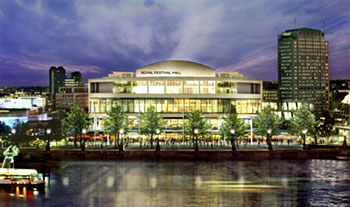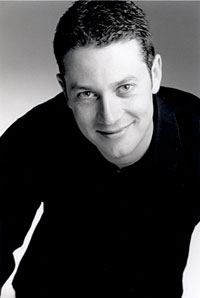

  |
|
|
||||||||||||||||||||||
|
FMS FEATURE... November 12, 2007 Korngold and His World London Philharmonic pays rare tribute to film music by Andrew Knowles  The concert formed part of the orchestra's 75th Anniversary Season and was billed under the general title of "Korngold and His World" to mark the 50th anniversary of the composers death. The concert opened with Korngold's suite from the 1940 Warner Bros. swashbuckler The Sea Hawk starring Errol Flynn. (This was the shorter version of the suite, not the extended 1972 version as recorded by the National Philharmonic Orchestra conducted by Charles Gerhardt on the RCA Red Seal label.) It was a reasonably good performance, though the tempos were slower than on the original soundtrack. There was a missed opportunity here, given that the LPO Choir was not employed for the stirring chorus, "Strike for the Shores of Dover." Next came a performance of Max Steiner's Casablanca Suite. Good as this was, his music from The Big Sleep and The Fountainhead are finer scores and show his composing skills to much better advantage. This was followed by the highlight of the evening: A most beautiful and moving rendition of Miklós Rózsa's haunting "The Love of the Princess" from Alexander Korda's magical The Thief of Bagdad. This is surely one of Rózsa's finest creations, sensitively scored and conveying – most beguilingly – the tender love between Prince Ahmed (John Justin) and the Princess (June Duprez). The first part of the concert ended with a suite from MGM's The Wizard of Oz, with an underscore by Herbert Stothart. Apart from Harold Arlen's well-known song from the film, "Over the Rainbow," there are some delightfully scored moments, including an effective use of a wordless chorus which found both orchestra and chorus in perfect accord with one another. The second part opened with the UK premiere of Korngold's music to Escape Me Never, Warner Bros.' 1947 remake of the 1935 British film (scored by William Walton), and regrettably Korngold's last released film. (He returned to Hollywood once more in 1954 to oversee the music to the Richard Wagner biopic, Magic Fire.) The LPO did justice to Korngold's sweeping romantic score. This was followed by a suitably swinging rendition of Alfred Newman's jazzy "Street Scene" from the Twentieth Century-Fox 1953 romantic comedy How to Marry a Millionaire. Again an opportunity was missed, because the extended Fox fanfare, which prefaces the film, was not included here. Yet following the performance, the conductor talked at length about the fanfare and its genesis, having not played a note of it. The concert continued with the familiar four-movement suite from Korngold's Academy Award-winning score for the 1938 classic The Adventures of Robin Hood. This was the film project that saved Korngold's life. Shortly after he returned to Hollywood to score the film, Hitler annexed Austria. Korngold, as a Jew, would certainly have been sent to a concentration camp had he remained there. The music from the film finds Korngold at the top of his form, and many people regard this score as perhaps his finest. It is superbly crafted, and fits the action and emotion of the story like hand in glove. It is how film scoring really should be done, and the LPO brought the score fully to life.  Conductor John Wilson The most recently composed music in the concert was by John Williams, with excerpts from his Oscar-nominated score to Steven Spielberg's 1977 film, Close Encounters of the Third Kind. The score moves from atonality to otherworldly lush romanticism, and the orchestra conveyed the moods of the score with deft assurance. However, once again, the LPO Chorus was left doing nothing when they should have been used to enhance the wonderful finale, as featured on the original soundtrack. The final selection in the programme was another UK premiere with a return to the music of Korngold. "Tomorrow" from the 1943 Warner Bros picture The Constant Nymph was arranged for Contralto voice, choir and orchestra, and the LPO was joined by the mezzo-soprano Anna Burford. The brooding atmosphere of the song came over reasonably well, though full enjoyment of this piece was seriously hampered by the inaudible text. All in all, it was a wonderful evening and a treat to be able to hear film music live in concert, a rare occurrence for UK audiences. There are two future concerts in the series featuring the music of Korngold – on November 14, when the Violin Concerto will be performed with Nikolaj Znaider as soloist; and on November 21, a concert performance of what Korngold regarded as his magnum opus, the opera Das Wunder der Heliane, receiving its UK premiere. The orchestra's principal conductor Vladimir Jurowski will conduct both evenings. ©2007 by Andrew Knowles |
Search
Past Features
Feature Archives
|